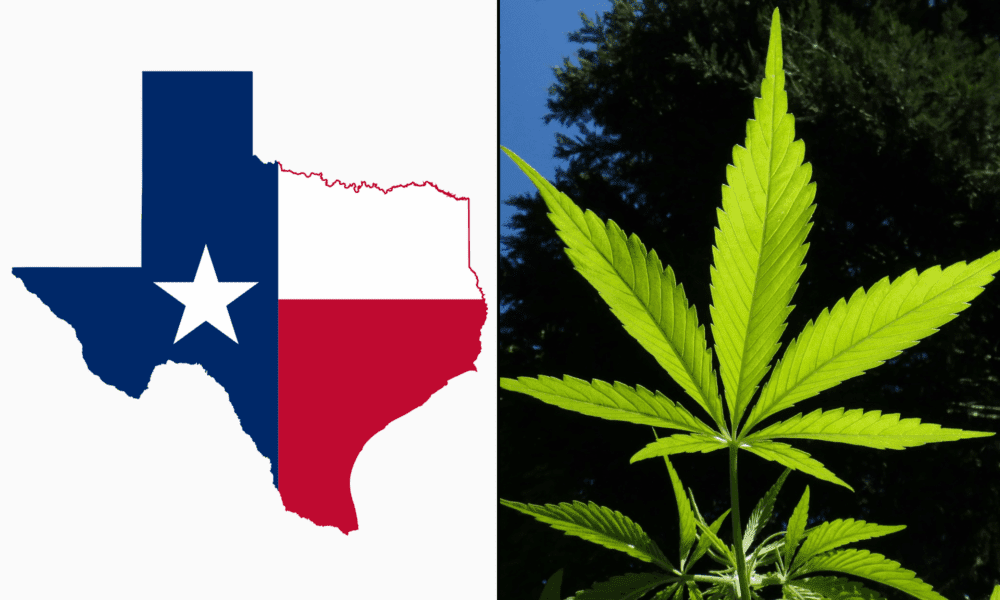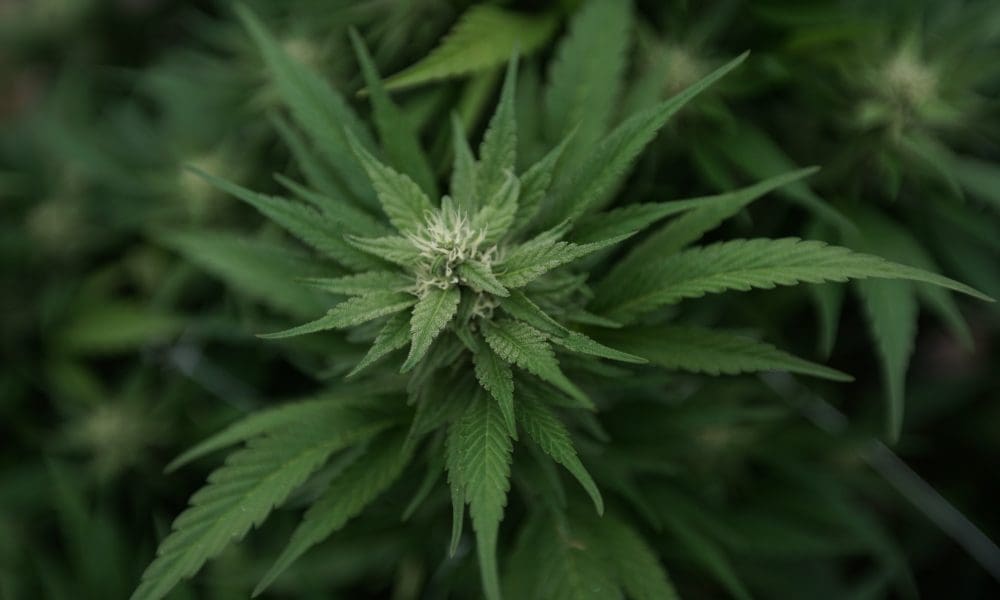featured
Marijuana Would Be Legalized In Texas Under New Bill Filed For Special Legislative Session
Published
2 days agoon

As lawmakers in Texas weigh whether to criminalize intoxicating hemp products containing any detectable amount of THC, a Texas Democrat has introduced a new bill that would legalize and regulate marijuana for adults 21 and older.
Another newly filed measure, meanwhile would order state officials to conduct a study on testing for THC intoxication.
The legalization bill—HB 195, introduced on Thursday by Rep. Jessica González (D)—would allow possession of up to 2.5 ounces of cannabis, with no more than 15 grams of that amount being in concentrated form. Adults could also share up to those amounts between one another provided the transfers aren’t advertised or promoted and don’t involve any type of payment.
At home, adults could keep up to 10 ounces total, with any amount over 2.5 ounces needing to be stored in a locked container or other restricted area, but home cultivation of marijuana for personal use would not be legal under the proposal.
Consuming marijuana in a motor vehicle, aircraft or watercraft would remain illegal, as would using marijuana in a public place unless a local government allows cannabis use in that area. Property owners could also prohibit tenants from smoking marijuana on the premises but could not ban consumption through other means or forbid possession of cannabis, cannabis products or paraphernalia.
The state’s commercial cannabis market would be overseen by the Texas Department of Licensing and Regulation (DLR), with licenses for growers, transporters, testing facilities, processors and retailers. Licensing would need to begin by November 1, 2026.
Specific industry rules would be set by the department’s governing board, the Texas Commission of Licensing and Regulation. The bill does specify some details, however, for example requiring that product packaging be child-resistant and clearly labeled as cannabis. Packaging could also not resemble that of commercially sold candy.
The commission would also be tasked with rules around restricting dangerous pesticides, advertising and display of products, security measures and tracking products through the cannabis supply chain.
Taxes and fees from the legal system would pay for DLR’s regulation the program (10 percent), the Department of Safety’s tasked oversight of marijuana lab testing (10 percent) as well as municipalities or counties in which at least one licensed cannabis business is located (20 percent). The remainder would go to fund the state’s Foundation School Program.
Local governments would need to affirmatively authorize that facilities are allowed in their jurisdictions. They could also set limits on the number of businesses and their locations, operating hours and other manners of conducting business.
Selling or delivering marijuana to a minor would be a Class C misdemeanor under the HB 195—unless the minor provided “apparently valid proof of identification”—with individual company employees subject to criminal liability.
Unlike many other state cannabis laws, the new 28-page legalization bill does not appear to contain any provisions intended to address past disparities in cannabis enforcement, such as priority licensing or reinvestment into communities disproportionately harmed by the drug war.
Heather Fazio, director of the Texas Cannabis Policy Center, told Marijuana Moment that advocates welcome HB 195’s introduction for the special session.
“As we continue the conversation about hemp regulation, we appreciate Rep. Gonzalez’s bill to simply legalize and regulate cannabis across the board,” Fazio said. “Her bill cuts to the chase: cannabis should be legal for adult use. Not more arrests. No more criminal records. And no more confusing policies. Just safe, legal cannabis in Texas.”
(Disclosure: Fazio supports Marijuana Moment’s work via a monthly Patreon pledge.)
Another measure introduced on Thursday, HB 198, would direct the Department of State Health Services to “conduct a study on establishing testing and scientific standards for determining tetrahydrocannabinol intoxication.”
The study, which would be due by the end of 2026, would need to include an evaluation of available and emerging testing methods, analysis of thresholds for intoxication “comparable to the standards applicable to blood alcohol content” as well as legislative recommendations on how lawmakers should proceed on the issue.
More cannabis- and hemp-related bills are still expected as the state’s special legislative session, which kicked off on Monday, unfolds.
Also this week, the governor of Texas explained where he stands on a renewed push in the legislature to ban most consumable hemp products, seemingly departing from a proposal that advanced through a Senate committee this week by calling for regulated access to low-THC hemp items for adults.
Gov. Greg Abbott (R) made headlines last month after vetoing an earlier hemp THC ban bill, SB 3, after which point he convened a special session with a mandate to legislators to take the issue, as well as others, back up. A new measure for the special session, SB 5 from Sen. Charles Perry (R), cleared the Senate State Affairs Committee on Tuesday and would effectively create the same prohibition the governor vetoed.
Asked about the proposal, Abbott told FOX 4 on Tuesday that he stands “in favor of doing all we can to protect the lives of our children, while also protecting the liberty of adults.”
“So the structure of what I’m looking for is this, and that is, we must continue to criminalize marijuana in the state of Texas—no change in the marijuana laws,” he said. “We need to ban THC, as well as hemp products, for children under the age of 21. We don’t want them to be exposed to that.”
He added that the state needs to “ban synthetics that are laced onto hemp products that are extraordinarily dangerous.” But once those safeguards are in place, the governor said “we need to have a highly regulated hemp industry to ensure that farmers are able to grow it, and that hemp products that do not have an intoxicating level of THC on it and can be sold in the marketplace for adults to be able to use.”
That’s where there’s some apparent splintering between what the governor is describing as his preference and what’s moving through the Senate.
Abbott gave a somewhat confusing definition of what he’d be comfortable with as far as allowable THC limits in hemp, saying there should be a “three percent” or “three milligram” cap, which is a meaningful difference. SB 5, on the other hand, would prohibit products with any quantifiable amount of THC or most other cannabinoids—explicitly exempting CBD and CBG from the ban, but industry stakeholders say that’s logistically unfeasible and would decimate the market.
“To be clear, with regard to adults—again, with minors, no access to it at all. For adults, we do want the THC level to be below 3 percent, or we’re doing it in milligrams, three milligrams of THC, and it’s called non-intoxicating levels of hemp that would be marketed,” the governor said. “But it would be a highly regulated system where, from the farmers to the wholesalers to the distributors to the retailers, there would be checks along the way to make sure that anybody involved in that entire system would not be able to be selling, transmitting, moving or involved in any hemp-based product that had more than three milligrams of hemp in it.”
Separately, a spokesperson for the governor issued a statement that largely aligns with what Abbott described in the interview.
“Governor Abbott has been clear that Texas must do all we can to protect the lives of children while protecting the liberty of adults. Hemp products should be banned for those under the age of 21, with a full ban on extraordinarily dangerous synthetic products,” they said. “Adults should be able to access heavily regulated, nonintoxicating levels of hemp, and there should be strict legal enforcement of hemp that exceeds 3.0 milligrams total THC per serving. The Governor will continue working with the legislature to establish a framework that meets those goals.”
Meanwhile, response to questions from senators during Tuesday’s Senate committee hearing, most law enforcement speakers said they supported an all-out ban on hemp products containing any THC rather than attempts at regulation. Some later added, however, that they felt the state’s limited medical marijuana program, known as the Texas Compassionate Use Program (TCUP), should be expanded to ease access by patients—especially military veterans—who could benefit from therapeutic cannabis.
Notably, Abbott in June signed a bill into law that expanded the state’s list of medical cannabis qualifying conditions, adding chronic pain, traumatic brain injury (TBI), Crohn’s disease and other inflammatory bowel diseases, while also allowing end-of-life patients in palliative or hospice care to use marijuana.
SB 5 is among a small handful of bills introduced for the new special session to address consumable hemp products.
Among the other proposals are measures to require extensive product warning labels and limit how hemp products are packaged.
Abbott has specifically asked lawmakers to prioritize hemp regulatory issues during the special session that kicked off on Monday. Two other newly introduced bills are HB 160 from Rep. Charlene Ward Johnson (D) and SB 39 from Sen. Judith Zaffirini (D).
The former would require a number of warning labels to be carried on hemp products with any more than trace amounts of THC, cautioning that the products can cause “cannabis poisoning that can be life-threatening to children,” harm brain development in youth, increase “risk of mental disorders like psychosis and schizophrenia” and lead to anxiety, depression and substance abuse disorders.
SB 39, meanwhile, would prohibit hemp products from being packaged or marketed “in a manner attractive to children,” limiting packaging shaped like humans, animals, fruit, cartoons or “another shape that is attractive to minors” as well as packaging that looks similar to legal products already marketed to children, for example candy or juice. It would also outlaw misleading product packaging. Violations would be a Class A misdemeanor, carrying up to a year in jail and a $4,000 fine.
Separately, last week Rep. Nicole Collier (D) introduced a one-page bill, HB 42, designed to protect consumers in the state from criminal charges if what they believed was a legal hemp product turned out to contain excessive amounts of THC, making it illegal marijuana. It would prevent the criminalization of someone found in possession of a product that’s labeled as hemp but is determined to contain “a controlled substance or marihuana.”
In order for the person to obtain the legal protection, the product would need to have been purchased “from a retailer the person reasonably believed was authorized to sell a consumable hemp product.”
The governor also said last month that rather than ban consumable hemp products outright, he wants to see lawmakers establish a regulatory framework that treats cannabinoids “similar to the way alcohol is regulated.”
Lawmakers at Tuesday’s hearing said that criminalization of possession would only kick in on a person’s third offense, however that provision does not seem to be included in the current version of SB 5.
Ahead of the governor’s recent veto of SB 3, hemp advocates and stakeholders had delivered more than 100,000 petition signatures asking Abbott to reject the measure. Critics of the bill argued that the industry—which employs an estimated 53,000 people—would be decimated if the measure became law.
Texas lawmakers legalized the sale of consumable hemp in 2019, following enactment of the 2018 federal Farm Bill, which legalized the plant nationwide. That led to an explosion of products—including edibles, drinks, vape products and cured flower—now sold by an estimated 8,000 retailers.
Military veterans advocates, including Texas Veterans of Foreign Wars, also called on the governor to veto the hemp ban, saying it “would cause irreversible harm to communities across the state.”
Farmers said the prohibition would devastate a key sector of the state’s agriculture industry.
Following his veto, Abbott proposed an extensive list of policy changes that he said he would support—and which the legislature will have the chance to enact during the special session.
“Texans on each side of the Senate Bill 3 debate raise serious concerns. But one thing is clear—to ensure the highest level of safety for minors, as well as for adults, who obtain a product more dangerous than what they expected, Texas must strongly regulate hemp, and it must do so immediately,” Abbott said.
Part of the rationale behind his veto was the risk of litigation over “valid constitutional challenges” that he suggested would hold up in court. Multiple top Texas hemp companies had already filed a preemptive lawsuit challenging the legislation before the governor’s veto.
“If I were to allow Senate Bill 3 to become law, its enforcement would be enjoined for years, leaving existing abuses unaddressed,” Abbott said in his veto message. “Texas cannot afford to wait.”
Rather than face the possibility of having the law enjoined, or indefinitely delayed, the governor said the state “must enact a regulatory framework that protects public safety, aligns with federal law, has a fully funded enforcement structure, and can take effect without delay.”
Meanwhile, a recent survey from a GOP pollster affiliated with President Donald Trump showed that Texas Democratic and Republican voters are unified in their opposition to the hemp ban bill.
Another poll commissioned the Texas Hemp Business Council (THBC) found that Texas Republican primary voters oppose the proposal.
Last month, the governor signed bill to significantly expand the state’s medical marijuana program with new qualifying conditions additional product forms and more dispensary locations.
Abbott separately signed a bill into law to create a state-backed research consortium to conduct clinical trials on ibogaine as a possible treatment for substance use disorders and other mental health conditions. The ultimate goal of the project is to develop the psychedelic into a prescription drug with federal Food and Drug Administration (FDA) approval, with the state retaining a portion of the profit.
The measure expands the state’s list of medical cannabis qualifying conditions to include chronic pain, traumatic brain injury (TBI), Crohn’s disease and other inflammatory bowel diseases, while also allowing end-of-life patients in palliative or hospice care to use marijuana.
Separately in Texas, a House committee approved a Senate-passed bill in May that would prohibit cities from putting any citizen initiative on local ballots that would decriminalize marijuana or other controlled substances—as several localities have already done despite lawsuits from the state attorney general.
Under the proposal, state law would be amended to say that local entities “may not place an item on a ballot, including a municipal charter or charter amendment, that would provide that the local entity will not fully enforce” state drug laws.
While several courts have previously upheld local cannabis decriminalization laws, an appellate court comprised of three conservative justices appointed by the governor has recently pushed back against two of those rulings, siding with the state in its legal challenge to the marijuana policy in Austin and San Marcos.
Despite the ongoing litigation and advancement of the House and Senate bills, Texas activists have their targets set on yet another city, Kyle, where they hope put an initiative before voters to enact local marijuana reform at the ballot this coming November.
A recent poll found that four in five Texas voters want to see marijuana legalized in some form, and most also want to see regulations around cannabis relaxed.
Image element courtesy of AnonMoos.

Author: mscannabiz.com
MScannaBIZ for all you Mississippi Cannabis News and Information.
You may like
-


Bipartisan Coalition Of 32 Attorneys General Pushes Congress To Urgently Pass Marijuana Banking Bill
-


Marijuana And CBD Provide ‘Significant Symptom Relief’ For Inflammatory Bowel Disease Patients, Federally Funded Study Finds
-


Doctor Who Allegedly Said ‘I Wonder How Much This Moron Will Pay’ Pleads Guilty
-


Killing reported at Oklahoma marijuana grow operation
-


Texas Voters Want Synthetic THC Outlawed, Poll Shared By Proponents Of Reining In Hemp Industry Finds
-


Judge rejects No Savage’s rap culture argument – NBC4 Washington
featured
Bipartisan Coalition Of 32 Attorneys General Pushes Congress To Urgently Pass Marijuana Banking Bill
Published
3 hours agoon
July 26, 2025
A bipartisan coalition of 32 state and territory attorneys general from across the U.S. are calling on Congress to pass a marijuana banking bill to free up financial services access for licensed cannabis businesses.
In a letter sent to House and Senate leaders on Thursday— led by the attorneys general from Washington, D.C., Georgia, Maryland and Ohio—the officials said they want to see the Secure and Fair Enforcement Regulation (SAFER) Banking Act taken up this session.
“We are a bipartisan group of state and territorial attorneys general who, like you, have a strong interest in protecting the physical and economic wellbeing of our constituents while enabling economic growth and stability in our respective states,” the letter says. “We therefore urge Congress to advance this legislation, which will increase access to regulated banking and financial services for state-regulated cannabis businesses in jurisdictions that have legalized these businesses.”
“It is increasingly critical to move cannabis commerce into the regulated banking system. The majority of states and several territories have legalized some use of cannabis,” it says. “As more states continue to consider and implement legalization efforts, the lack of access to America’s financial system by cannabis businesses—which is a direct result of federal banking law—presents a considerable safety issue for the public.”
The officials stressed that, under current federal policy, many marijuana businesses are forced to operate on a largely cash-only basis, making them targets for crime and putting employees and customers “at greater risk.”
“Allowing access to the nation’s regulated banking system is crucial to public safety and to ensuring that lawful businesses in our states have access to regulated banking services,” they wrote.
Today I joined a bipartisan coalition urging Congress to pass the SAFER Banking Act. Legal cannabis businesses in states like Maryland are forced to operate in cash because of outdated federal rules—putting workers at risk and making it harder to collect taxes and enforce the… pic.twitter.com/n2YPAGIcnQ
— Anthony G. Brown (@OAGMaryland) July 24, 2025
The letter also states that the current lack of banking access for the cannabis industry makes tax collection and oversight more challenging, and the SAFER Banking Act “would help ensure that state governments do not forfeit hundreds of millions of dollars in tax revenue that the cannabis industry generates.”
However, despite the attorneys general saying at the top of the letter that they’re voicing support for the “SAFER Banking Act of 2025,” the bill has not yet been reintroduced this session, so it’s unclear whether any provisions might be changed from the prior version that died at the end of the last Congress.
“To address these challenges, we request that Congress advance the SAFER Banking Act or similar legislation. Congress should provide a safe harbor for depository institutions that provide a financial product or service to a covered business in a state that has implemented laws and regulation that ensure accountability in the cannabis industry. An effective safe harbor would bring billions of dollars into the banking sector, enabling law enforcement, federal, state, and local tax agencies, and cannabis regulators in the states and territories to more effectively monitor cannabis businesses and their transactions. Compliance with tax laws would be simpler and easier to enforce with the regulated tracking of funds in the banking system, resulting in higher tax revenues.”
“The SAFER Banking Act is common-sense, bipartisan, and will beneficially impact the safety of the nearly 75 percent of Americans who live in a state where cannabis has been legalized,” the letter concludes. “The bill respects both state sovereignty and the current status of cannabis at the federal level. It does not encourage legalization, nor does it facilitate cannabis sales in states that have chosen not to legalize it.”
“The SAFER Banking Act simply addresses the specific public policy challenges facing states in light of the federal prohibition on banking cannabis-related funds, and it does so in a way that will help move cash from legal cannabis businesses into the highly regulated banking system, where it will be more transparent to state regulators and law enforcement,” it says. “We look forward to working on this bipartisan issue with you.”
The other signatories on the letter are the attorneys general of Alaska, American Samoa, Arizona, California, Colorado, Connecticut, Delaware, Hawai’i, Illinois, Maine, Massachusetts, Michigan, Minnesota, Nevada, New Jersey, New Mexico, New York, Northern Mariana Islands, Oklahoma, Oregon, Pennsylvania, Rhode Island, South Dakota, U.S. Virgin Islands, Utah, Vermont, Washington and West Virginia.
“When legal cannabis businesses are forced to operate in cash, it’s not just inefficient–it’s dangerous,” Arizona Attorney General Kris Mayes (D) said in a press release. “The SAFER Banking Act is a practical solution that will protect workers and communities while ensuring Arizona can effectively collect taxes and oversee this growing industry.”
Michigan Attorney General Dana Nessel (D) said that, “By reducing the risk of crime and improving tax compliance through access to regulated financial services, the SAFER Banking Act has the ability to enhance both public safety and transparency.”
“With billions in revenue, giving cannabis businesses a secure place to bank isn’t just smart policy—it’s common sense,” she said.
Colorado Attorney General Phil Weiser (D), meanwhile, said he’s “been urging Congress to allow cannabis companies to access the commercial banking system for years because of the safety risks many cannabis companies take on simply to do business.”
Attorney General Phil Weiser today joined a bipartisan coalition of attorneys general in calling on Congress to pass legislation which would provide legal clarity for banks and financial institutions to serve state-regulated cannabis businesses. Read more: https://t.co/Umb0v9hW8L pic.twitter.com/7gVfEDZrcB
— Colorado Attorney General (@COAttnyGeneral) July 25, 2025
“This commonsense reform will also make it easier for Colorado to oversee the industry, better protecting consumers, public safety, and public health,” he said.
Meanwhile, the Democratic Senate sponsor of the marijuana banking bill recently said that, despite efforts to coordinate meetings around the legislation, other priorities have taken precedence for now.
Asked about recent comments Sen. Bernie Moreno (R-OH)—the lead GOP sponsor of the SAFER Banking Act this session who told Marijuana Moment that he doesn’t expect the bill to come up until this fall—Sen. Jeff Merkley (D-OR) said, “Hopefully sooner than later in my mind.”
In January, the office of Rep. Dave Joyce (R-OH), who is again leading the effort on the House said, told Marijuana Moment that he would be filing the cannabis banking legislation this session but that its introduction was “not imminent” as some earlier reports had suggested.
A leading anti-marijuana group recently sounded the alarm about a possible attempt to put the cannabis banking measure in a cryptocurrency bill that was advancing on the Senate floor, but that didn’t come to fruition.
With Republicans in control of both chambers and key leadership positions filled by opponents of marijuana legalization, it’s been an open question about whether any cannabis reform legislation stands a chance of passage in the short-term. That’s despite the fact that President Donald Trump endorsed marijuana industry banking access, federal rescheduling and a Florida legalization initiative on the campaign trail. However, he’s been silent on the issue since taking office.
On the House side, a Republican lawmaker said in March he’s hopeful that Congress will be able to get a marijuana banking bill across “the finish line” this session, arguing that the current barriers to financial services for the industry represent a “second tier” of prohibition.
Cannabis industry banking challenges came up in several congressional hearings in March, including a Senate Banking Committee meeting on debanking where senators on both sides of the aisle addressed the lack of financial services access for marijuana businesses.
Meanwhile, in January congressional researchers released a report detailing the subject of debanking—while making a point to address how the marijuana industry’s financial services access problem “sits at the nexus” of a state-federal policy conflict that complicates the debate.
Separately, the Government Accountability Office (GAO) announced in December that it’s convening focus groups comprised of marijuana businesses to better understand their experiences with access to banking services under federal prohibition.
—
Marijuana Moment is tracking hundreds of cannabis, psychedelics and drug policy bills in state legislatures and Congress this year. Patreon supporters pledging at least $25/month get access to our interactive maps, charts and hearing calendar so they don’t miss any developments.![]()
Learn more about our marijuana bill tracker and become a supporter on Patreon to get access.
—
The industry remains frustrated with the lack of progress on the cannabis banking issue under the last administration.
A Senate source told Marijuana Moment in December that Republican House and Senate leadership “openly and solely blocked” then-Senate Majority Leader Chuck Schumer’s (D-NY) attempt to include the bill in a government funding bill as the session came to a close.
Sens. Elizabeth Warren (D-MA) and Tommy Tuberville (R-AL) had challenged the idea that there was enough GOP support for the SAFER Banking Act to pass on the Senate floor during the lame duck session.
Warren accused certain Republican members of overstating support for the legislation within their caucus, while also taking a hit at Trump for doing “nothing” on cannabis reform during his time in office as he makes a policy pivot ahead of the election by coming out in support of the marijuana banking bill and federal rescheduling.
Sen. John Hickenlooper (D-CO) also recently argued in an interview with Marijuana Moment that the main barrier to getting the marijuana banking bill across the finish line is a lack of sufficient Republican support in the chamber. And he said if Trump is serious about seeing the reform he recently endorsed enacted, he needs to “bring us some Republican senators.”
Prior to becoming House speaker, Rep. Mike Johnson (R-LA) consistently opposed cannabis reform, including on incremental issues like cannabis banking and making it easier to conduct scientific research on the plant.
Meanwhile, on the one-year anniversary of a Senate committee’s passage of the SAFER Banking Act in September, the Congressional Budget Office (CBO) released an analysis on the economic impact of the reform, including the likely increase in federally insured deposits from cannabis businesses by billions of dollars once banks receive protections for servicing the industry.
Separately, the CEO of the financial giant JPMorgan Chase said recently that the company “probably would” start providing banking services to marijuana businesses if federal law changed to permit it.

Author: mscannabiz.com
MScannaBIZ for all you Mississippi Cannabis News and Information.
featured
Marijuana And CBD Provide ‘Significant Symptom Relief’ For Inflammatory Bowel Disease Patients, Federally Funded Study Finds
Published
4 hours agoon
July 25, 2025
A majority of patients with inflammatory bowel disease (IBD) said they felt marijuana and CBD were “beneficial” and provided “significant symptom relief” from their disorder, according to a new federally funded survey-based study.
With support from the National Institutes of Health (NIH), researchers at Case Western Reserve University conducted a survey of IBD patients, inquiring about different treatment options they feel could effectively address the pain and other symptoms associated with their condition.
More than 50 percent of participants who reported using cannabis said they feel it’s an effective therapeutic option, offering “relief from abdominal pain, other pain, stress, anxiety, depression, and nausea/vomiting.”
“The strong support of cannabis and CBD oil as medical treatments and therapeutic effects highlights the potential for cannabis and CBD oil as treatments in IBD,” the study authors said. “Notably, 19.4 percent of IBD patients reported decreased opioid use, and 14.5 percent reported induced remission with cannabis or CBD oil,” the study says.
“The beliefs on the efficacy of cannabis and CBD oil are comparable to that of prescribed medications (e.g., corticosteroids and biologics/immunosuppressants), suggesting that cannabis may be perceived as equally effective. These results show that there exists a strong belief that these substances could be favorable to various IBD symptom relief, including abdominal pain, diarrhea, anxiety, and inflammation.”
The researchers noted that a significant portion of respondents with IBD self-reported using cannabis (54 percent) or CBD (41 percent) for “medical use, symptom relief, pain management, and mental health support.”
“A large proportion, 63 percent, of IBD participants reported that cannabis had a somewhat, very, or extremely beneficial effect in relieving their IBD symptoms, while 57 percent held this belief about CBD oil,” it says.
“Interestingly, we found that IBD patients were more likely to have used cannabis or CBD oil for short-term symptom relief (37 percent and 26 percent, respectively) compared to long-term symptom relief (23 percent and 18 percent, respectively). Such a pattern indicates that, among IBD patients, these substances are considered to be more effective in the management of acute symptoms rather than in the long-term management of the disease.”
The survey-based cross-sectional study involved 139 participants, including 106 IBD patients and 39 non-IBD controls between the ages of 18 and 69.
The authors concluded that the study demonstrated “increasing interest and positive perceptions by IBD patients toward the use of cannabis and CBD oil as complementary or alternative therapies for symptom management.”
It also “highlights the common perception among IBD patients that cannabis and CBD oil are effective therapeutic agents for symptom management, in spite of the lack of conclusive clinical evidence.”
“The findings indicate that a significant proportion of IBD patients use cannabis, notice symptom relief, and prefer its therapeutic use,” the study says.
The results comport with a scientific review of research on the impacts of marijuana on inflammatory bowel diseases such as Crohn’s disease (CD) and ulcerative colitis (UC) that was released last year, finding that cannabinoid therapy helped reduce disease activity and improved quality of life in patients with the chronic diseases.
In March of last year, a separate study in the Journal of Health Research and Medical Science found that “cannabinoids show potential in improving disease activity” and quality of life in patients with ulcerative colitis.

Author: mscannabiz.com
MScannaBIZ for all you Mississippi Cannabis News and Information.
featured
Doctor Who Allegedly Said ‘I Wonder How Much This Moron Will Pay’ Pleads Guilty
Published
5 hours agoon
July 25, 2025
It’s been almost two years since the world woke up to the news of the death of Matthew Perry, one of the most iconic American actors of the ’90s and ’00s. Best known for playing the beloved and inexhaustibly funny Chandler Bing on Friends, Perry not only left an indelible mark on millennial pop culture but also became a powerful voice in raising awareness about addiction.
In his autobiography, Friends, Lovers and the Big Terrible Thing, the actor shared his painful story of substance abuse, seeking to provide hope and inspire others in this situation.
Although drug use was not initially suspected as the cause of death, Perry’s autopsy revealed that he died from the acute effects of ketamine. The actor had reportedly been receiving therapy with this substance to treat depression and anxiety. While this drug is becoming a more popular and scientifically backed treatment for mental health, supervision by a professional is essential to ensure safety and effectiveness.
According to CTV News, Perry did indeed have such assistance, but allegedly began taking more ketamine than prescribed without his doctor’s knowledge, obtaining it illegally.
Now, in a grim turn of events, the doctor who allegedly administered the substance to Perry has pleaded guilty. Dr. Salvador Plasencia is accused, along with four others, of supplying ketamine to the actor. Prosecutors allege the defendants exploited Perry’s history of addiction for financial gain.
Another defendant is Dr. Mark Chavez, who allegedly provided the drug to Plasencia. According to Chavez’s plea agreement, text messages exchanged between the two doctors reflect a disdainful and inhumane attitude toward Perry. One example: Plasencia allegedly wrote “I wonder how much this moron will pay” in reference to the actor.
His question did not go unanswered: according to Healing Maps, Perry paid approximately USD 55,000 for six to eight daily ketamine injections during the month prior to his death.
Furthermore, Plasencia allegedly visited the actor’s home multiple times to administer the substance, reaching exorbitant amounts (up to $12,000) per visit. He also allegedly taught injection techniques to Perry’s assistant, Kenneth Iwamasa, who is among the defendants as well.
Jasveen Sangha, known as the “Ketamine Queen,” is also among the accused, having allegedly sold the dose of ketamine later determined to be lethal. However, she has pleaded not guilty and has not yet reached an agreement with the prosecutor’s office.
On his part, Plasencia faces up to 40 years in prison, although he will likely receive a lesser sentence. Upon pleading guilty, he said he was “deeply sorry” and announced his intention to give up his medical license.
While he didn’t admit to selling Perry the lethal dose, he did acknowledge acting with full knowledge of Perry’s history of problematic substance use. In fact, when the actor suffered an episode of paralysis and spiked blood pressure after receiving an injection, the (soon-to-be ex-) doctor had no problem making more doses available.
Beyond the bitter taste left by these news, compounded by the deep affection that an entire generation felt for the actor, this case highlights several problems that can no longer be swept under the rug, such as the vulnerability of people suffering from addiction, their exploitation for profit by so-called professionals, and the trivialization of increasingly popular mental health treatments that, while scientifically proven to be effective, are not necessarily administered safely.
Disclaimer: All individuals mentioned are presumed innocent until proven guilty in a court of law. This article is based on publicly available legal documents and media reports at the time of publication. It is intended for informational purposes only and does not constitute legal or medical advice.
Photo: Policy Exchange, CC BY 2.0, via Wikimedia Commons / Cropped.

Author: mscannabiz.com
MScannaBIZ for all you Mississippi Cannabis News and Information.

Bipartisan Coalition Of 32 Attorneys General Pushes Congress To Urgently Pass Marijuana Banking Bill

Marijuana And CBD Provide ‘Significant Symptom Relief’ For Inflammatory Bowel Disease Patients, Federally Funded Study Finds

Doctor Who Allegedly Said ‘I Wonder How Much This Moron Will Pay’ Pleads Guilty

Killing reported at Oklahoma marijuana grow operation

Texas Voters Want Synthetic THC Outlawed, Poll Shared By Proponents Of Reining In Hemp Industry Finds

Judge rejects No Savage’s rap culture argument – NBC4 Washington

California Moves to Ban Hemp Wellness Products — And the Weed Nuns Are Fighting Back

Cannabis & Psychedelics Reported Most Effective Non-Prescription Drugs by Eating Disorder Patients

Kentucky Governor Urges Trump To Oppose Bill Blocking Marijuana Rescheduling That’s Advancing In Congress

New York cannabis board approves 52 new licenses, pushes total to 1,851

South Park Loves Marijuana – The Fresh Toast

Lo Más Reciente de High Times en Español

DEA Judge Overseeing Cannabis Rescheduling Process Retires

GOP Senator Threatens To Block Spending Bill If Hemp THC Product Ban Stays In, Sources Say

The Best Delicious Summer Cocktails

The Race to Nowhere: How Chasing Potency Undermines Cannabis Quality (Opinion)

Weed & Psychedelics Are Doing for Eating Disorders What Big Pharma Couldn’t, Survey Says

Congressional Committee Pushes To ‘Eliminate’ Illegal Marijuana Grows And Tackle Money Laundering By Chinese-Linked Cannabis Operations

Supreme Court Will Discuss Ban On Marijuana Users’ Gun Ownership In September

Watch: £1m cannabis factory found in town’s old Woolworths store | News

Texas cannabis legalization bill filed in hemp-focused special session (Newsletter: July 25, 2025)

Mississippi AG takes aim at hemp products, including Delta THC | State

Judge overseeing cannabis rescheduling retires, leaving it to Trump’s DEA head (Newsletter: July 24, 2025)

Marijuana Use Has A Positive Impact On Consumers’ Careers, Poll Says

Alert: Department of Cannabis Control updates data dashboards with full data for 2023

Connecticut Appoints The US’s First Cannabis Ombudsperson – Yes there is a pun in there and I’m Sure Erin Kirk Is Going To Hear It More Than Once!

5 best CBD creams of 2024 by Leafly

EU initiative begins bid to open access to psychedelic therapies

Free delta-9 gummies from Bay Smokes
New Study Analyzes the Effects of THCV, CBD on Weight Loss

5 best autoflower seed banks of 2024 by Leafly

May 2024 Leafly HighLight: Pink Runtz strain

Curaleaf Start Process Of Getting Their Claws Into The UK’s National Health System – With Former MP (Resigned Today 30/5/24) As The Front Man

Mississippi city official pleads guilty to selling fake CBD products

Discover New York’s dankest cannabis brands [September 2024]

Horn Lake denies cannabis dispensary request to allow sale of drug paraphernalia and Sunday sales | News

Local medical cannabis dispensary reacts to MSDH pulling Rapid Analytics License – WLBT

Press Release: CANNRA Calls for Farm Bill to Clarify Existing State Authority to Regulate Hemp Products

Nevada CCB to Accept Applications for Cannabis Establishments in White Pine County – “Only one cultivation and one production license will be awarded in White Pine County”

5 best THC drinks of 2024 by Leafly

The Daily Hit: October 2, 2024

6 best CBD gummies of 2024 by Leafly

5 best delta-9 THC gummies of 2024 by Leafly

Weekly Update: Monday, May 13, 2024 including, New Guide for Renewals & May Board meeting application deadline

People In This State Googled ‘Medical Marijuana’ The Most, Study Shows

PRESS RELEASE : Justice Department Submits Proposed Regulation to Reschedule Marijuana

Thailand: Pro-cannabis advocates rally ahead of the government’s plan to recriminalize the plant

Press Release: May 9, STIIIZY and Healing Urban Barrios hosted an Expungement Clinic & Second Chance Resource Fair
Trending
-

 California Cannabis Updates1 year ago
California Cannabis Updates1 year agoAlert: Department of Cannabis Control updates data dashboards with full data for 2023
-

 Breaking News1 year ago
Breaking News1 year agoConnecticut Appoints The US’s First Cannabis Ombudsperson – Yes there is a pun in there and I’m Sure Erin Kirk Is Going To Hear It More Than Once!
-

 best list12 months ago
best list12 months ago5 best CBD creams of 2024 by Leafly
-

 Business10 months ago
Business10 months agoEU initiative begins bid to open access to psychedelic therapies
-

 Bay Smokes1 year ago
Bay Smokes1 year agoFree delta-9 gummies from Bay Smokes
-

 cbd1 year ago
cbd1 year agoNew Study Analyzes the Effects of THCV, CBD on Weight Loss
-

 autoflower seeds10 months ago
autoflower seeds10 months ago5 best autoflower seed banks of 2024 by Leafly
-

 California1 year ago
California1 year agoMay 2024 Leafly HighLight: Pink Runtz strain

